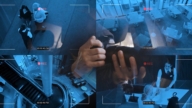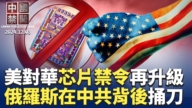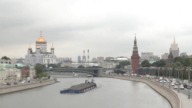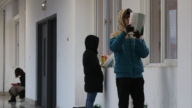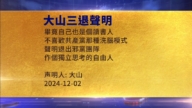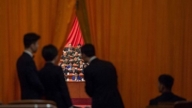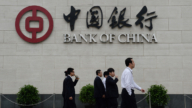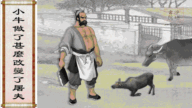【新唐人2014年07月10日訊】德國總理默克爾,日前在北京「清華大學」發表了演講,儘管她的演講主題是「環境和可持續發展」,但是她毫不忌諱的談到「人權」和「言論自由」。她強調,東德共產黨政權的倒臺,使自由對話成為可能。但是這些內容卻被中共媒體刪除了。
從7月6號開始,德國總理默克爾展開了為期三天的訪華之行。8號在行程的最後一天,梅克爾在「清華大學」發表了「環境和可持續發展」為主題的演講。
在演講中,默克爾絲毫不避諱人權等話題,在共產黨統治的前東德長大的她,用委婉的語言直擊尖銳話題,強調保護人權和言論自由的重要性。
默克爾說:「對我來說,這個對話(中德人權對話)非常重要,因為25年前一場和平的革命在前德意志民主共和國發生,最終導致「柏林牆」倒塌,讓我們得以進行自由的對話。」
大陸網路作家荊楚:「共產黨在人類社會上,它僅僅是一個反面教材,這是人類社會的共識。現在共產黨宣稱甚麼宇宙真理呀,還要堅持共產黨,連輸出革命的蘇俄都垮臺了,而這個共產黨作為蘇俄的傀儡政權,還依然存在,那是多麼荒唐。」
而且默克爾強調:「我認為,在中國進行這樣的自由對話,也是很重要的。」
荊楚:「一群漢奸、賣國賊竊奪了(中國)國家政權,建政幾十年了,(中共)它一直反對甚麼人性、人道、人權,這些基本的價值,現在雖然羞答答的簽訂了世界人權宣言,但是它那是為了欺騙國際社會,它對國內的人是青面獠牙,那是它的本質。共產黨的垮臺是歷史的必然。」
默克爾在這次講話中,不單提到了人權,還告訴學生們說,「為了成功的塑造未來,你們需要一個開放、多元、自由的社會。這些原則是一個社會未來成功的基礎。」
據了解,這是自2005年以來,默克爾的第7次訪問中國。這也不是她第一次關注中國人權問題。在今年三月,中共領導人習近平訪問歐洲時,默克爾也曾談到相關的問題。
荊楚:「我肯定是認同的,他們講的是人類文明基本的一個共識,但是在中國聽起來像是天方夜譚,多麼可悲呀,也就是說中國與世界隔絕到何種程度。」
大陸史傳作家王第也表示,很多大陸人都會認同默克爾的觀點,但是中共不會認同。
大陸史傳作家王第:「中共它的屬性決定的,因為它本來就是專職獨裁的集團,不能真正融入普世價值,它所做的一切都是為了加強它的統治,這樣注定是要失敗。」
除此之外,默克爾還談到了法治和公正的重要性。她說:「很重要的一點是,公民能夠相信法律的力量,而不是權力至上的法則。」
《法國新聞社》報導說,默克爾和最近訪問中國的許多其他西方領導人,形成了鮮明的對比。為了和全球第二大經濟體發展貿易,這些領導人都避免在公開場合提及中國的人權問題。
據了解,中共媒體在報導默克爾演講時,有關人權和自由的部分,都予以封殺。
荊楚:「它故意把它刪掉,這是大陸媒體的一貫做法,它生怕提到人權、人道、人性的東西,對共產黨的根基有所動搖,想方設法不讓老百姓知道,這是他們一貫做法。」
默克爾此行原本計劃會見遭關押的大陸異議人士高瑜之子,但北京警方要求高瑜的獨生子趙萌必須回絕梅克爾的邀請。
採訪編輯/田淨 後製/周天
Angela Merkel Talks Human Rights at Tsinghua University
German Chancellor Angela Merkel delivered a speech
on global economic sustainability and climate change
at Tsinghua University.
She openly discussed human rights
and the importance of free speech.
She emphasized that the fall of the Communist regime
in East Germany has made free speech possible.
But these contents of her speech have been censored
by the Chinese Communist media in its reporting .
German Chancellor Angela Merkel made a three-day visit
to China between July 6 and 8.
On the last day, she delivered a speech at Tsinghua University
on topics of the environment and sustainable development.
Merkel spoke frankly to the students, in carefully worded
remarks, on the sharp topic of human rights.
The German leader, who grew up in the former East Germany,
emphasized the importance of human rights and free dialogue.
Merkel also spoke of East Germany, formally known as the
German Democratic Republic, “To me, this dialogue is very
important because 25 years ago, when the peaceful revolution
took place in the former GDR, this finally led to the fall
of the Berlin Wall and enabled us to have a free dialogue."
Jing Chu, online writer: “In human society, the Communist
Party is nothing but an example of backwardness.
This is the consensus of human society.
Despite claims about ‘universal truths’
and continuing to insist on the Communist Party,
even the Soviet Union has collapsed.
Yet this puppet regime of the USSR still exists, how absurd."
Merkel stressed, “I think it’s also important here in China
to have such a free dialogue."
Jing Chu: “A group of traitors have seized China’s state power.
In its decades of rule, it has continually opposed basic values
such as human nature, human morality and human rights.
Though it signed the Universal Declaration of Human Rights,
that was only a ploy to deceive the international community.
But it unleashes its ghastly true nature on mainland Chinese.
The collapse of the Communist Party is a historical necessity."
Merkel also told the students, “It’s important to have laws
on this regard, that function as a guardian of principles.
“You need an open, pluralistic and free society
in order to shape the future successfully."
This is Merkel’s seventh visit to China since 2005,
and it isn’t the first time she’s raised concerns
over human rights in China.
During Chinese leader Xi Jinping’s visit to Europe in March,
Merkel had also talked about related issues.
Jing Chu: “It’s the basic consensus of human civilization,
and I definitely agree with it.
But in China, such things sound like a fairy tale.
How sad!
China has become so isolated from the rest of the world."
Historical biographer Wang Di says many Chinese people
can all agree with Merkel’s opinions, but the CCP can’t.
Wang Di: “This is determined by the nature of the CCP.
It’s a dictatorship to begin with
and it can’t fit with universal values.
Everything it does is to secure its power,
and in this way it is doomed to fail."
Merkel also spoke about the rule of law and justice.
She said, “It’s important that citizens can believe in
the power of the law and not the law of the powerful."
AFP reports that, “Merkel’s comments are in contrast to many
other recent Western visitors to China, who have shied away
from public comments on human rights as they pursue trade
deals with the world’s second-biggest economy."
Chinese state media reportedly left out the parts of her speech
related to human rights and freedom.
Jing Chu: “They deliberately delete it,
which is a normal practice in mainland Chinese media.
Any mention of human rights, morality or human nature
that could shake the foundation of the party will be blocked.
That is their usual practice."
Merkel’s trip originally included a meeting with Zhao Ming,
the son of the jailed Chinese dissident Gao Yu.
But Zhao Ming was reportedly told by the police
to reject the invitation.
Interview Edit/TianJin Post-Production/ZhouTian



